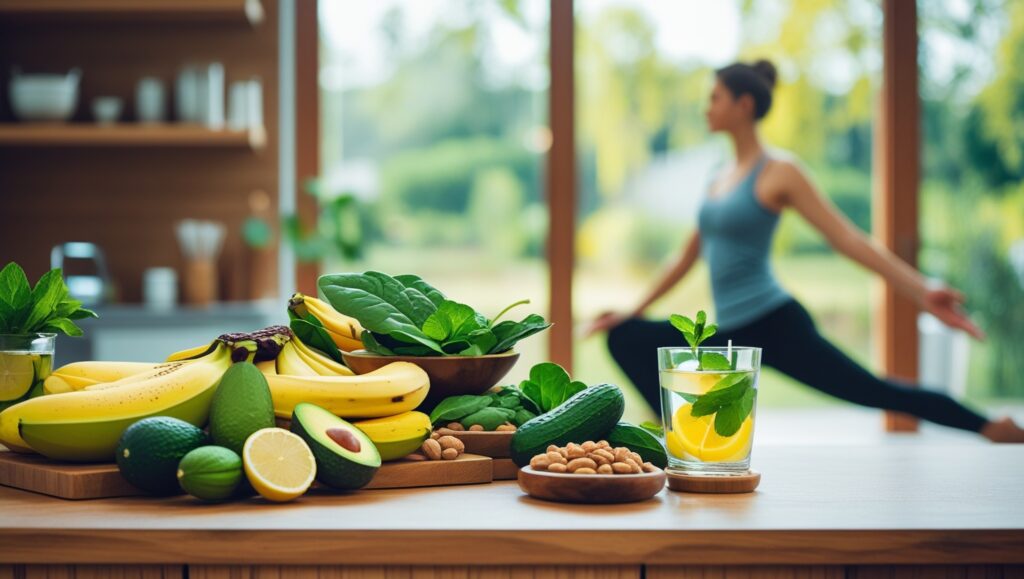Bloating and water retention can make you feel uncomfortable, sluggish, and frustrated. Fortunately, a few simple dietary changes can help reduce bloating, improve digestion, and prevent fluid buildup. By incorporating these strategies into your daily routine, you can achieve a flatter stomach and feel lighter in no time.
Understanding Bloating and Water Retention
Bloating occurs when excess gas or fluid builds up in the digestive system, causing the stomach to feel swollen. Water retention, also known as edema, happens when the body holds onto excess fluids, leading to puffiness in the face, hands, legs, and abdomen.
Common Causes of Bloating and Water Retention
- High Sodium Intake – Too much salt in the diet can cause the body to retain water.
- Dehydration – When the body lacks water, it holds onto fluids to prevent dehydration.
- Poor Digestion – Gas buildup from certain foods or digestive issues can lead to bloating.
- Hormonal Changes – Menstrual cycles, pregnancy, and hormone imbalances can affect fluid retention.
- Processed Foods – Highly processed foods contain preservatives and artificial ingredients that contribute to bloating.
5 Simple Diet Changes to Reduce Bloating and Water Retention
1. Reduce Sodium Intake and Eat More Potassium-Rich Foods
Too much sodium causes the body to hold onto water, leading to bloating and puffiness. Processed foods, canned goods, and fast food are the biggest culprits.
How to Cut Back on Sodium:
- Choose fresh, whole foods instead of processed meals.
- Use herbs and spices instead of salt to flavor food.
- Read labels and choose low-sodium options when buying packaged products.
Increase Potassium-Rich Foods:
Potassium helps balance sodium levels and flush out excess water. Include:
- Bananas
- Avocados
- Spinach
- Sweet potatoes
- Coconut water
2. Drink More Water to Flush Out Toxins
It may sound counterintuitive, but drinking more water actually helps reduce water retention. When the body is dehydrated, it holds onto fluids, causing bloating.
Tips for Staying Hydrated:
- Drink at least 8-10 glasses of water per day.
- Start your morning with a glass of warm lemon water to aid digestion.
- Eat water-rich foods like cucumbers, watermelon, and celery.
- Avoid excess caffeine and alcohol, which dehydrate the body.
3. Eat More Fiber and Probiotics for Better Digestion
Poor digestion is a major cause of bloating. A diet rich in fiber and probiotics promotes a healthy gut and prevents gas buildup.
Best Fiber-Rich Foods:
- Oats
- Chia seeds
- Berries
- Leafy greens
- Lentils
Probiotic-Rich Foods for Gut Health:
Probiotics introduce beneficial bacteria to the gut, aiding digestion and reducing bloating. Include:
- Yogurt
- Kefir
- Sauerkraut
- Kimchi
- Miso soup
4. Cut Down on Artificial Sweeteners and Carbonated Drinks
Many artificial sweeteners and carbonated drinks cause bloating by creating excess gas in the stomach.
Foods to Avoid:
- Soda and sparkling water – Carbonation traps gas in the digestive system.
- Sugar alcohols (sorbitol, xylitol, maltitol) – Found in sugar-free gum, candies, and diet products.
- Chewing gum – Increases swallowed air, leading to bloating.
Healthier Alternatives:
- Drink herbal teas like peppermint or ginger tea.
- Choose natural sweeteners like honey or stevia in moderation.
- Opt for infused water with fresh fruits instead of sodas.
5. Increase Magnesium Intake to Prevent Fluid Retention
Magnesium plays a crucial role in reducing water retention and relaxing the digestive muscles to prevent bloating.
Best Magnesium-Rich Foods:
- Dark chocolate (in moderation)
- Almonds and cashews
- Pumpkin seeds
- Leafy greens (kale, spinach)
- Legumes (black beans, lentils)
Supplementing with magnesium citrate may also help, but always consult a healthcare provider before taking supplements.
Additional Lifestyle Tips to Reduce Bloating
Move Your Body
Light exercise such as walking, stretching, or yoga improves circulation and prevents fluid buildup. Even 10-15 minutes of movement can help relieve bloating.
Try Herbal Teas
Certain herbal teas aid digestion and reduce bloating naturally. The best options include:
- Peppermint tea – Soothes digestive muscles.
- Ginger tea – Reduces inflammation and speeds up digestion.
- Dandelion tea – Acts as a natural diuretic to flush out excess water.
Manage Stress Levels
Chronic stress can increase cortisol levels, leading to fluid retention and bloating. Practices like meditation, deep breathing, and journaling can help manage stress and improve digestion.
Final Thoughts
Bloating and water retention can be frustrating, but making small changes to your diet can lead to significant improvements. By reducing sodium, staying hydrated, eating fiber and probiotics, avoiding artificial sweeteners, and boosting magnesium intake, you can say goodbye to bloating and feel your best.
